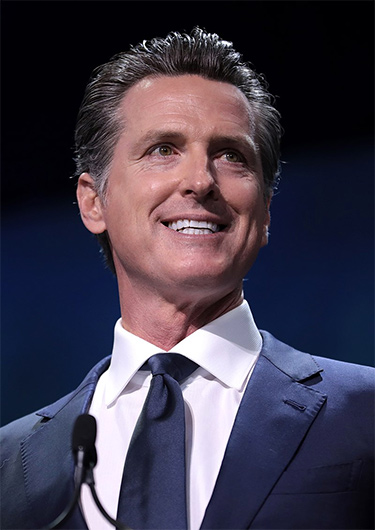By Jim Ellis
July 30, 2021 — The University of California at Berkeley’s Institute of Governmental Studies released their latest Golden State survey that finds Gov. Gavin Newsom’s (D) strength in the upcoming recall election dissipating.According to UC Berkeley, among likely voters, 47 percent would vote to recall Gov. Newsom and 50 percent would not, clearly the closest ballot test result seen to date. The recall election is scheduled for Sept. 14, and voters will first choose whether to remove the governor from office before choosing a replacement among 46 ballot qualified candidates. The replacement candidates’ votes count only if a majority supports removing the subject from office, in this case Gov. Newsom.
The Berkeley poll (July 18-24; 5,795 registered California voters; 3,266 likely California recall election voters, online) finds Newsom in trouble only among likely voters, those screened as almost certain to participate in the recall election. Within the entire polling sample, he returns to safe territory as the respondents break only 36-51 percent for removing him from office.
The major difference is partisanship. The parties, as one might guess, break in polarized fashion. A total of 91 percent of Democrats would vote against the recall while 95 percent of Republicans favor removal.
The independent and minor party sectors become interesting, however. Among the large No Party Preference group, 46 percent would vote to recall Newsom and 50 percent would not. The combined minor parties, which only account for approximately six percent of the electorate are breaking hard for the recall position. Within the minor party segment, 68 percent would vote to remove as compared to only 30 percent supporting the retain option.
Among Republicans, 90 percent say they are enthusiastic about the election, while 58 percent of Democrats say the same. Among the substantial segment in the “No Party Preference” or independent category, 53 percent say they are enthusiastic.
The polling analysis suggests that the governor’s fundamental problem is that Democrats are “almost unanimous” in their belief that he will win the recall election. This substantially explains the Democrats’ lack of solid enthusiasm for the irregular Sept. 14 stand-alone election.
Though Republicans only account for just under a quarter of the registered California electorate, the enthusiasm level for the recall substantially increases their clout. The Berkeley pollsters estimate their share of the electorate would be worth 33 percent under their turnout model. Democrats, who account for 46 percent of the Golden State registered voter universe, would drop to 42 percent under the projected participation model used for this survey. The No Party Preference (Independent) group is as large as the Republican base, but the enthusiasm question reduces them to accounting for just 18 percent of the recall electorate.
Geography is also key to the result. Not surprisingly, Los Angeles County and the San Francisco Bay Area break heavily for Newsom. The Central Coast, the areas in and around Monterey and Carmel, slightly favor retention.
The remainder of the state’s geographic segments as the pollsters determined, Orange County, San Diego County, the Inland Empire (Riverside/San Bernardino/Ontario), the Central Valley (Stockton/Fresno/Bakersfield), and the North Coast/Sierras all favor removal, with Orange County and the Inland Empire leading the removal sector each with a 60-38 percent division in favor of change.
In terms of gender, males favor removal by a 53-46 percent count, where females support retaining Gov. Newsom breaking 55-42 percent. A bit surprisingly, the oldest voters favor retention with the strongest percentages. Among those 65-74 years of age, 56 percent would vote to retain while 43 percent favor recall. In the 75 or older segment, the governor would survive in a 53-46 percent division.
Among the replacement candidates, Los Angeles radio talk show personality Larry Elder (R), who had to petition a court to receive his ballot placement after the Secretary of State ruled him ineligible, leads with 18 percent preference. John Cox (R), the former gubernatorial candidate and one-time presidential contender as well as having failed to attain office in Illinois, and former San Diego mayor, Kevin Faulconer (R), are tied with 10 percent. State Assemblyman Kevin Kiley (R-Granite Bay/Sacramento) is next with five percent, while media star Caitlin Jenner (R) attracts only three percent support.
The UC Berkeley poll clearly shows Gov. Newsom is in weakened position for the recall, but also identifies how he can easily recover. It appears all that he needs to repel the removal effort is to re-energize the less reliable Democratic voter group.
Such is certainly doable, and the Newsom campaign’s strategy of claiming the recall is Donald Trump-driven seeks to accomplish this objective. Whether or not they can convince the casual voter to turnout for an unusual Sept. 14 election does make their task slightly more difficult, however.

